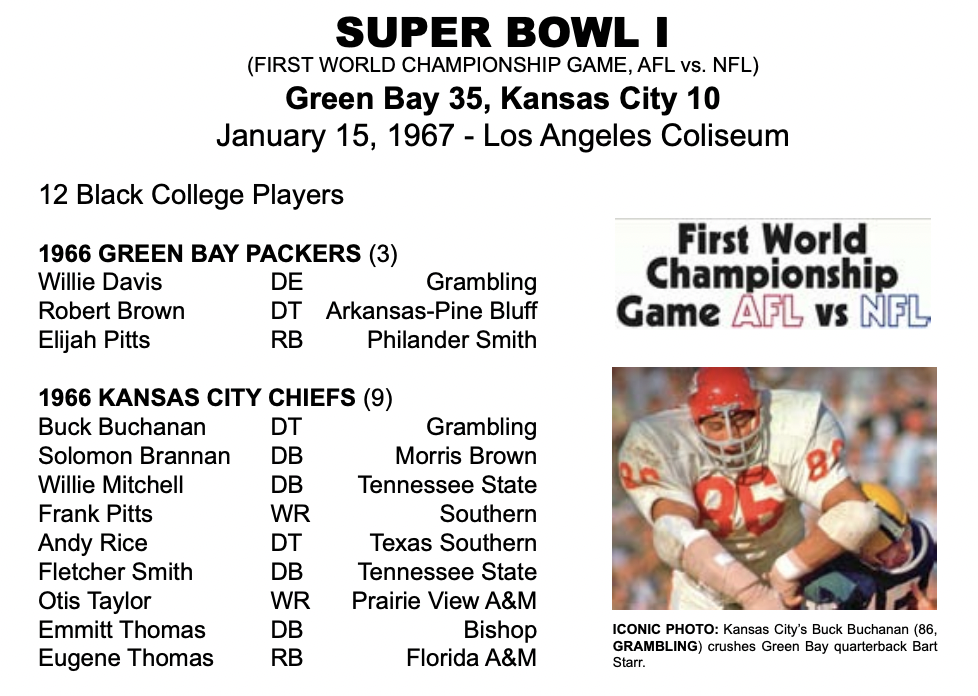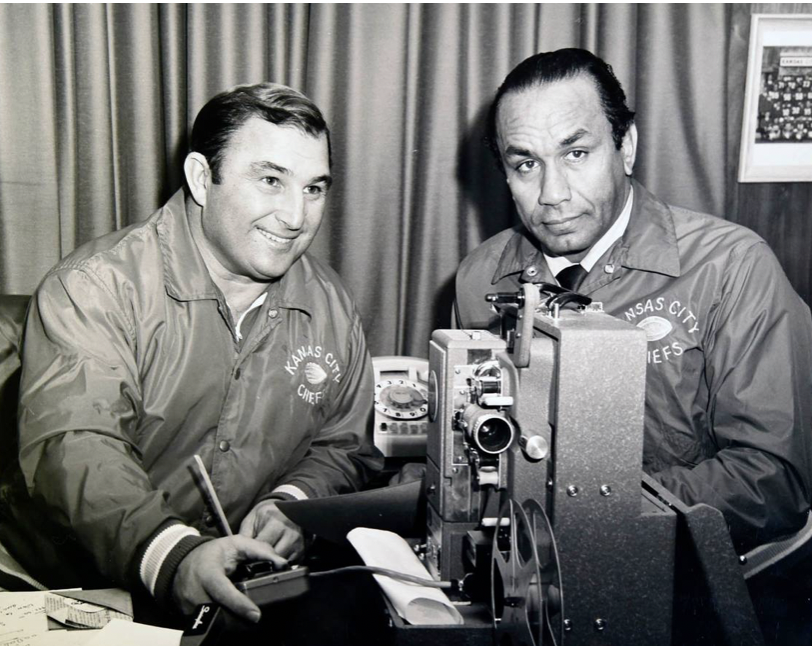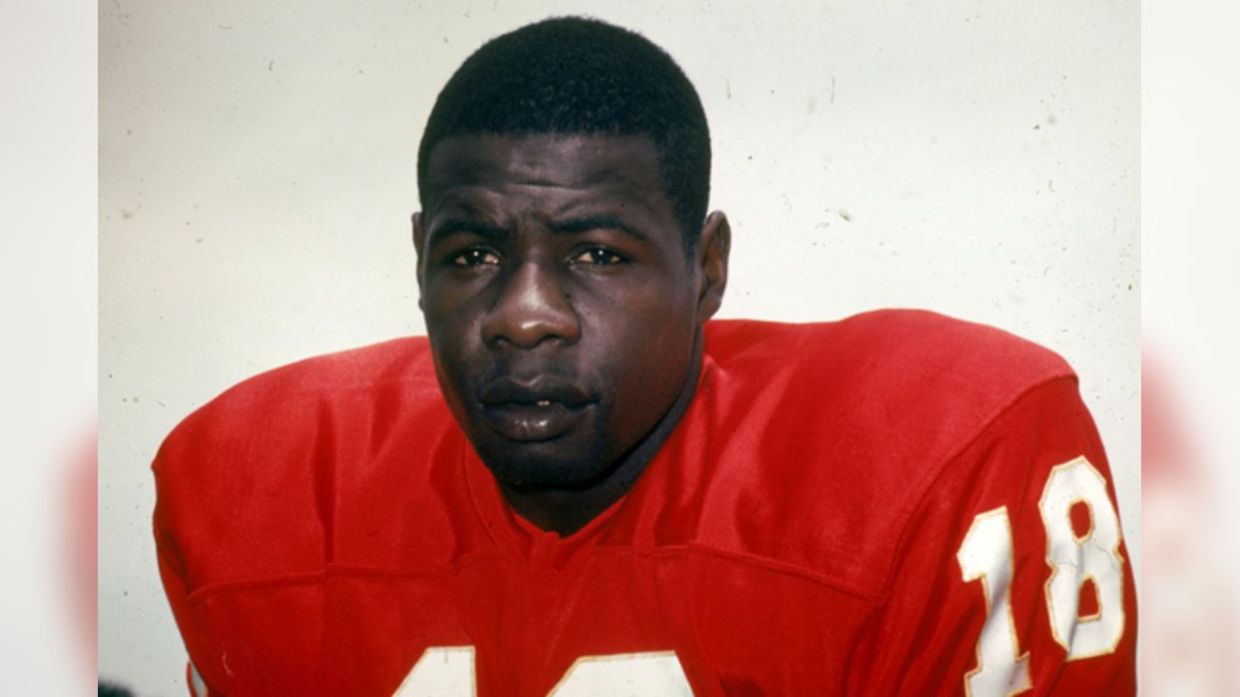Long before quarterback Patrick Mahomes led Kansas City to three Super Bowls in the last four seasons, HBCU players fueled the Chiefs’ rise to pro football prominence.
Cook, who spent two years at Howard in the MEAC before finishing his college career at Cincinnati, went in the second round. Williams, who went in the fourth round, played at Fayetteville State of the CIAA.
The pair each had four tackles and combined for an interception (video) in Kansas City’s 23-20 win over Cincinnati in last week’s AFC Championship Game.
They will be continuing a tradition of HBCU players on Chiefs’ Super Bowl teams.
Kansas City’s HBCU Super Bowl history – Emmitt Thomas
Nine HBCU products were on the Chiefs’ 42-man roster as they lost to NFL champion Green Bay, 35-10. The Packers had just three HBCU players.
Emmitt Thomas was an undrafted rookie defensive back for the Chiefs in that inaugural game. He had played quarterback, wide receiver and cornerback at Bishop College, a now defunct HBCU in Marshall, Texas. Bishop was a founding member of the Southwestern Athletic Conference (SWAC) in 1920 and stayed in the league until 1956. The school relocated to Dallas in 1961 before shuttering its doors in 1968. (See Note below).

Thomas, now 79 years old, was the Chiefs Honorary Captain in its AFC Championship Game win over Cincinnati Sunday. He presented the AFC championship trophy, the Lamar Hunt Trophy, to the Chiefs in postgame ceremonies.
Kansas City’s HBCU Super Bowl history – Buck Buchanan and Otis Taylor
Another HBCU standout on the Chiefs’ squad that year was defensive tackle Junious “Buck” Buchanan of Grambling. The 6-7, 270-pound Buchanan had been the first overall pick in the 1963 AFL draft. As if to accentuate the difference between the way HBCU players were treated by the NFL and AFL brass then, Buchannan was taken in the 19th round, 265th overall by the NFL’s New York Giants.
On the fifth play of this first Super Bowl game, Buchanan crushed Green Bay quarterback Bart Starr for a 10-yard loss. It was the first sack in Super Bowl history. He went on to post three other tackles that day.

Also playing for the Chiefs that day was talented, acrobatic wide receiver Otis Taylor of Prairie View A&M. Taylor was taken by Kansas City in the fourth round, 29th overall, of the 1965 AFL Draft. By contrast, the NFL’s Philadelphia Eagles took him in the 15th round.
“The Judge”
The man responsible for the Chiefs making serious investments in HBCU players is Lloyd ‘Judge” Wells. A Texas Southern graduate, Wells had been a sports photographer and very active in civil rights and desegregation issues in the Houston area. He became a part-time scout for the Chiefs in the early 1960s and became the first full-time African-American scout in professional football in 1964.

The story of Taylor landing with the Chiefs is the stuff of legend. Wells absconded with Taylor out the back door of a local Houston motel where the NFL’s Dallas franchise had tried to hide him away. The next day he signed with Kansas City. This ‘babysitting’ incident showed the lengths to which Wells and the fledgling league would go to acquire the valuable talent coming out of the HBCU ranks.
13 HBCU players for the Chiefs in Super Bowl IV

Three years later, Kansas City was again AFL champion and back in the Super Bowl to face the NFL champion Minnesota Vikings. This time, 13 players from HBCUs were on the Chiefs’ 1970 Super Bowl IV roster. That number stands as the highest HBCU contingent on one Super Bowl team to this day. Eight alone were from the SWAC. The Vikings were the first team in Super Bowl history to enter the game with no HBCU players on their roster.
Wells had been instrumental in adding middle linebacker Willie Lanier, taken in the second round of the 1967 draft out of Morgan State. Lanier was the first African-American to play the all important position of middle linebacker in the pro football.
Wells also had added defensive backs Jim Marsalis of Tennessee State (1st round, 1969), Jim Kearney of Prairie View A&M and Goldie Sellers of Grambling. The Chiefs had also added HBCU studs on offense including running back Robert Holmes of Southern, wide receivers Frank Pitts of Southern and Gloster Richardson of Jackson State and dynamic kick returner Noland “The Gnat” Smith of Tennessee State.
Three of Judge’s recruits to the Chiefs — Buchanan, Lanier and Thomas — landed in the Pro Football Hall of Fame. Buchanan, Lanier, Taylor, Thomas and Wells are in the Black College Football Hall of Fame.
HBCU players dominant in Super Bowl IV
Lanier had seven (7) tackles and an interception in the game. Buchanan had six (6) tackles and one sack for -8 yards. With those two stalwarts leading the way, the Chiefs held to Vikings to 67 rushing yards on 19 carries.
After losing Super Bowl I to Green Bay, the Chiefs, 13 1/2-point underdogs, made it two wins in a row for the AFL. The New York Jets had been first, beating the Baltimore Colts 16-7 in Super Bowl III. Kansas City defeated the Vikings, 23-7 in the final Super Bowl before the merger of the two leagues. In fact, these back-to-back AFL wins all but assured the league’s would merge.

Just how dominant were they?
The fingerprints and footprints of Kansas City’s 13 black college players’ (five were still on the roster from Super Bowl), were all over this game. They in fact were dominant!
In one second-half Minnesota series, as if inspired by a scintillating 46-yard touchdown by Taylor (see the video here), a former HBCU player had a tackle on the kickoff return, made tackles on four consecutive plays from scrimmage before intercepting a pass.
In the game, black college players combined for more than half the Kansas City tackles (25 on 47 Viking plays from scrimmage), had two interceptions, one sack, scored the clinching touchdown, got 40 of the Chiefs’ 151 rushing yards and 114 of their 122 net passing yards.
It would have been hard to decide which black college player should get the MVP award. Perhaps that’s why Kansas City quarterback Len Dawson got it. Perhaps?
KC returns to Super Bowl with HBCU players
It would be 50 years, in Super Bowl LIV in 2020, before Kansas City would make another appearance in the Super Bowl. Defensive back Alex Brown out of South Carolina State was the only former HBCU player on the roster on in the game. Brown played on special teams but did not have a stat in the Chiefs’ 31-20 win over the San Francisco 49ers.
A year later in Super Bowl LV, another South Carolina State product, defensive back Antonio Hamilton was the only HBCU player on the Chiefs’ roster. Hamilton played on special teams in Kansas City’s 31-9 loss to Tampa Bay.
OF NOTE: Founding members of the SWAC in 1920 were Bishop College, Paul Quinn College, Prairie View A&M, Texas College and Wiley College.
